African, European, Indian and many other cultures melted together into one rainbow culture. It has to be lived, it has to be felt, the rainbow rhythm of Africa. From modern art galleries to ancient rock art sites, from museums to cultural villages, from jazz clubs to open air festivals.
Venues ranging from deep bush to outdoor theatres, from botanical gardens to night clubs and luxurious theatre complexes. These are some of the ways you can live, feel and experience our South African culture. In South Africa you will find seven World Heritage sites, ”places of outstanding value to humanity”, as determined by Unesco’s World heritage committee. South Africa facts and statistics
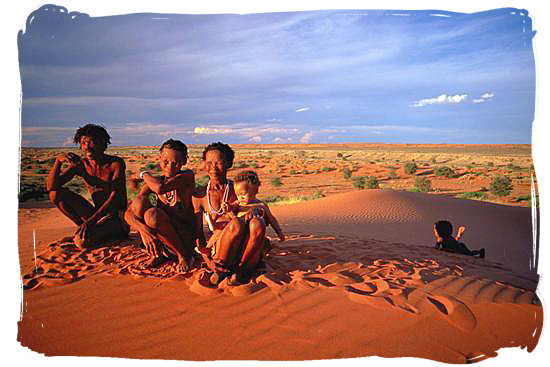
Bushman family, members of South Africa's most ancient culture
Interesting Facts about South Africa - copyright © South African tourism
Population,...
South Africa is a nation of 44,8 million people of highly diverse origins, cultures, languages and beliefs. Signs of the very first population in the country in the form of human fossils, have been dated as far back as 3,5 million years ago by archaeologists.
The earliest population in South Africa that we can identify and name, and whose descendents are still part of our population today, are the San and the khoi. Collectively called the Khoisan people. They have been living in our country for thousands of years, but are now threatened by extinction. South Africa’s people have classified themselves as follows; 79% Black, 9,6% White, 8,9% coloured and 2,5% Indian/Asian.
Language,...
South Africa has 11 official languages and scores of unofficial ones besides. Some of the African languages are mutually understood, and many South Africans speak two or more of them, besides their own language.
While each language is equal to the other, English has emerged as the preferred dominant language. It is used on road signs and in official documents. It is also the main medium of instruction in schools and most universities. English is understood and spoken well by almost all South Africans, in addition to their own language. South Africa facts and statistics
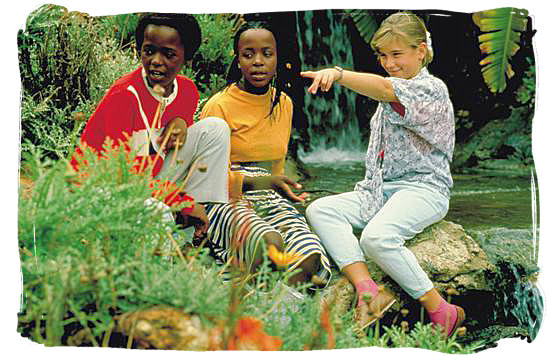
Young South Africans, the future of our country
Interesting Facts about South Africa - copyright © South African tourism
Climate,...
South Africa generally enjoys a mild and pleasant climate, with lovely warm and sunny weather, without being sweltering, and with mild winters. Do take note of the fact that the South African seasons are the opposite to those in the northern hemisphere. So,…yes,…you can spend Christmas on the beach in our country.
The areas with the most significant differences in weather pattern are;...the Western Cape, with its Mediterranean climate, consisting of warm, sometimes windy summers and wet, cold winters,...the interior and northern areas with hot summer days cooled down with frequent afternoon thunder showers, and sunny, crispy cool winters,...and the eastern and south eastern coastal areas, with sub tropical almost sweltering beach weather, and mild winters. South Africa facts and statistics
Flora and Fauna,...
When one mentions the words “South African flora”, the picture of a typical south African savannah landscape, with its more-or-less thickly scattered shrubs and thorn trees, comes to mind most of the time. A picture that most South Africans carry in their hearts. However, it’s much more then that.
South Africa has one of the highest levels of biodiversity in the world and is home to an astonishing variety of plants, comprising 22,000 species, many of them endemic. Ours is the only country in the world that contains an entire plant kingdom within its borders, the Cape Floristic Kingdom,… 8,600 species, of which more then 6,000 are indigenous. The Cape Peninsula alone has more species then the whole of Great Britain.
South Africa is the natural habitat of many species of animals, home to more then 300 mammal species, over 500 bird species, over 100 species of reptiles, and countless insects. Our most famous four-footed inhabitants are of course the Big Five. The elephant, buffalo, lion, leopard and rhinoceros. The days when one could see large herds of impalas, wildebeest (Gnu’s), zebra, giraffe and many other species move through South Africa’s country side, are long past.
Because our country has a long history of protecting our animal population by means of nature reserves and national parks, it remains blessed with abundant wildlife. South Africa’s seas are rich in fish species, more then 2,000 to be exact, comprising 16% of the world’s total. Perhaps the most awesome of these is the great white shark. Birdlife is abundant and snakes are common in most of the country. South Africa facts and statistics
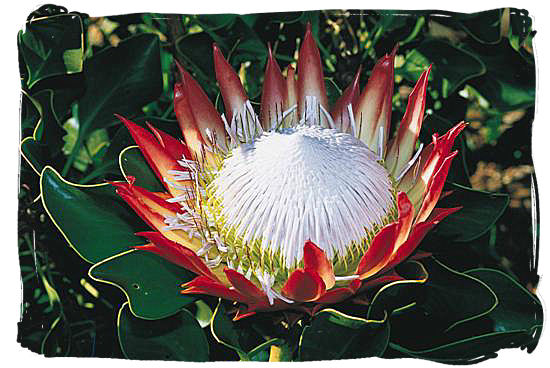
King Protea, royal member of the unique South African Cape Floristic Kingdom
Interesting Facts about South Africa - copyright © South African tourism
Health Care,...
South Africa health care standards are exceptionally high, meeting world standards without a problem. Facilities are much similar as those found in the USA and in Europe. The country’s health system consists of a large public sector and a smaller but fast-growing private sector. We do not have a national health scheme in our country. Medical insurance in South Africa is a matter of private and individual responsibility, by means of private medical scheme insurers who offer a variety of choices.
For those who can not afford medical insurance, there is the public health sector, consisting of a structure of provincial and academic hospitals throughout the country, supported by a fast-developing network of primary and preventative health care facilities and services at grass-roots level, close to where it is needed. The public health sector is largely financed by the government, consuming around 11% of the national budget. South Africa facts and statistics
Government,...
South Africa is a constitutional democracy, with a constitution that is regarded as one of the most progressive in the world, and a "Bill of Rights" second to none. The country has a three-tier system of government, and an independent judiciary, operating under a parliamentary structure. The government is decentralised in national, provincial and local levels of government, each with its own legislature and executive, all based on a system of interdependent, interrelated and co-operative government.
The three-tiers of government have been structured to acknowledge the diversity of the needs and concerns of the population of South Africa, each with its own distinctive framework of powers and responsibilities. Parliament consists of two houses, the National Assembly with 400 members, elected by popular vote, and the National Council of Provinces with 90 members, 10 from each province, who are appointed by their provincial legislatures. The South African State President is elected by the national Assembly and is the executive Head of State and Head of the cabinet. He may not serve more then 2 five-year terms in office. South Africa facts and statistics
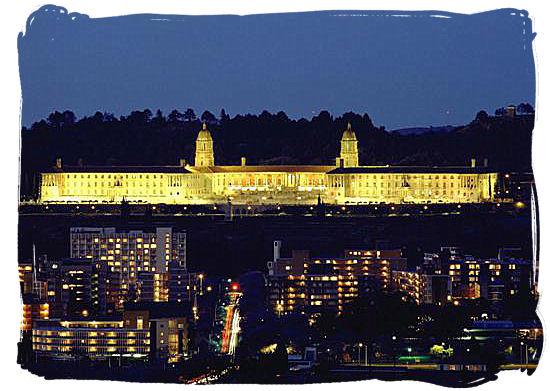
Union Buildings in Pretoria, office of the State President and his executive
Interesting Facts about South Africa - copyright © South African tourism
History,...
The earliest known civilization in South Africa, were the San and the khoi peoples, collectively known as the khoisan. They inhabited the southern tip of the African continent thousands of years before the first Europeans arrived at our coasts. Africa populations in central and northern Africa were growing fast, necessitating enlargement of territory, which led to the migration of black African peoples to Southern Africa. Scientists believe that this process of migration started some 2000 years ago, hundreds of years before the first Europeans landed on our beaches.
They were Jan van Riebeeck and his 90 men, under instruction from the Dutch East India Company, to build a supply station at the Cape of Good Hope for their eastern trading route. This was the start of a colonial expansion process, that eventually led to the settlement of a white population over virtually all what is today South Africa. With the arrival of the Europeans in the country, the seeds of racial strife and conflict were sown.
Seeds that grew and developed in the form of ever growing white domination over the coloured population. This resulted in the infamous era of apartheid and freedom struggle. At the end it was victory to the freedom struggle and defeat of apartheid in February 1990, when Nelson Mandela and all other political prisoners were released from prison. The first free and democratic government under one of the most progressive constitutions was elected in April 1994. South Africa facts and statistics
Economy,...
The industrialisation of south Africa commenced with the discovery of gold in 1888 on the Witwatersrand. Since then the country has developed into the economic powerhouse of Africa, with a GDP equal to 25% of the entire GDP of the African continent. South Africa’s sophisticated physical and financial infrastructure provides the ideal investment platform, for entry into markets of other African countries.
Cornerstone sectors of our country’s economy are;… MINING, as the world’s biggest producer of gold and platinum, MANUFACTURING, adding value to its wealth of minerals and base materials and TOURISM, as one of the world’s most favourite travel destinations. The country’s thriving and bustling informal economy represents untapped potential for its future economic development.
Expected economic growth (2005) = 4%, expected consumer price inflation (2005) = 5%, expected growth of investment (2003-2006) = 6%, Unemployment (2005) = 30% - 42%. Largest trade and investment partner = Europe. South Africa is entering a period of strong growth and is expected to achieve a sustained growth rate of 5% or more. South Africa facts and statistics
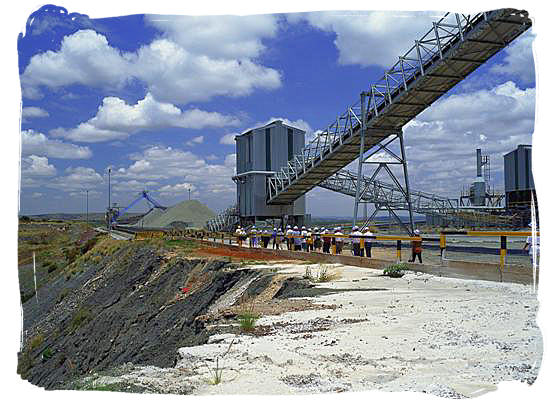
Goldmining in South Africa, one of the corner stones of South Africa's economy
Interesting Facts about South Africa - copyright © South African tourism
Education,...
South Africa has a well-developed first world standard education system. It has 12 million learners, 366 000 teachers and around 28 000 schools – including 390 special needs schools and 1000 registered private schools. Of all the schools 6 000 are high schools (grade 7 to grade 12) and the rest are primary schools (grade 1 to grade 6).
The country has a vibrant higher education sector, with more then a million students enrolled in its 21 public universities, 15 technikons and many colleges. All the universities and technikons are autonomous, reporting to their own councils rather then government. Many of our universities are world-class academic institutions, at the forefront of scientific research in a number of spheres. South Africa facts and statistics
Sport,...
South Africa has the perfect climate for outdoor sporting activities. No wonder that most South Africans have always had a passionate love affair with sport, taking their country to become one of the top performers in the world. Sport has been a major factor in uniting our people during the transformation process from apartheid to a free democracy. Some of the major sports South Africa excels in, are Rugby, Cricket and Football (Soccer).
For close on a century, the country has regularly fielded teams of world-beating class. It is the game of football or soccer however, that has won the hearts of most of the black population. But the list of sport activities in our country goes wider. Our country has bred world-beating stars in quite a number of sports, like Golf, Boxing, Ultra marathon running and Athletics, besides others.
South Africa has proved itself on the world stage as a country capable of not only playing sport at international top level, but also of hosting large international sporting events, like the 1995 Rugby World Cup and the 2003 World Cricket Cup. In 2010 it will be hosting the biggest sporting event after the Olympic Games, the Football World Cup. South Africa facts and statistics
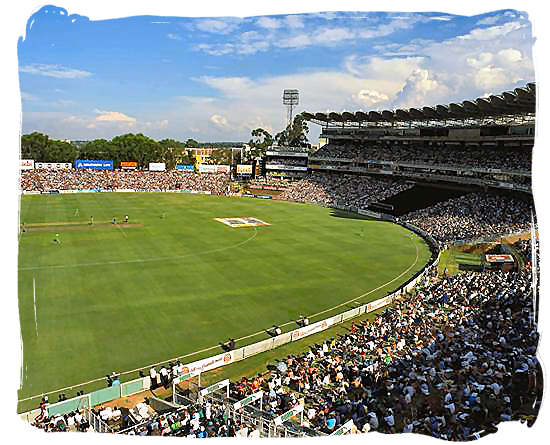
The Wanderers Cricket ground in Johannesburg
Interesting Facts about South Africa - copyright © South African tourism
No comments:
Post a Comment